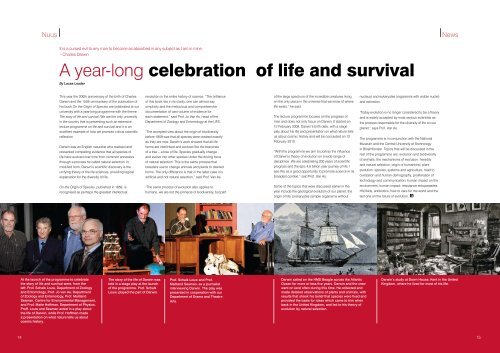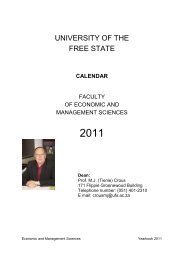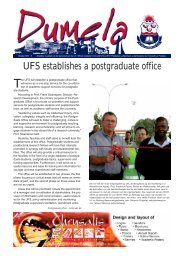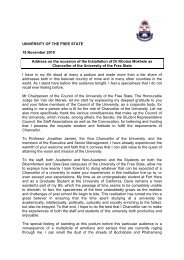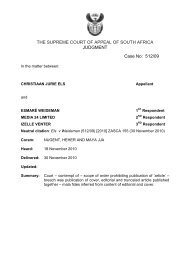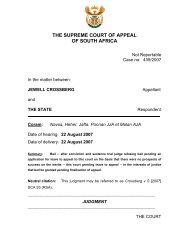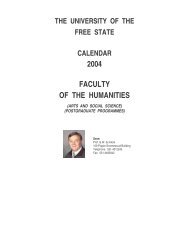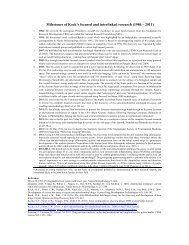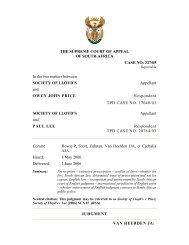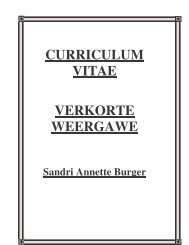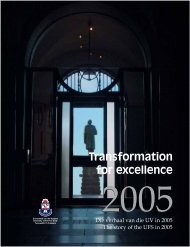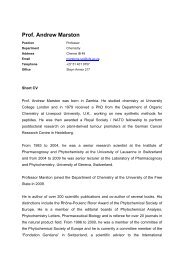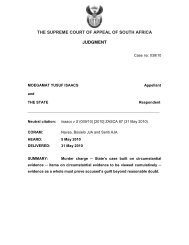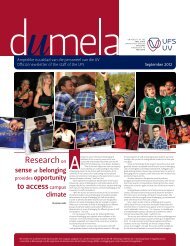You also want an ePaper? Increase the reach of your titles
YUMPU automatically turns print PDFs into web optimized ePapers that Google loves.
Nuus News<br />
It is a cursed evil to any man to become as absorbed in any subject as I am in mine.<br />
– Charles Darwin<br />
A year-long celebration <strong>of</strong> life and survival<br />
By Lacea Loader<br />
This year <strong>the</strong> 200th anniversary <strong>of</strong> <strong>the</strong> birth <strong>of</strong> Charles<br />
Darwin and <strong>the</strong> 150th anniversary <strong>of</strong> <strong>the</strong> publication <strong>of</strong><br />
his book On <strong>the</strong> Origin <strong>of</strong> Species are celebrated at our<br />
university with a year-long programme with <strong>the</strong> <strong>the</strong>me<br />
The story <strong>of</strong> life and survival. We are <strong>the</strong> only university<br />
in <strong>the</strong> country that is presenting such an extensive<br />
lecture programme on life and survival and it is an<br />
excellent example <strong>of</strong> how we promote critical scientific<br />
reflection.<br />
Darwin was an English naturalist who realised and<br />
presented compelling evidence that all species <strong>of</strong><br />
life have evolved over time from common ancestors<br />
through a process he called natural selection. In<br />
modified form, Darwin’s scientific discovery is <strong>the</strong><br />
unifying <strong>the</strong>ory <strong>of</strong> <strong>the</strong> life sciences, providing logical<br />
explanation for <strong>the</strong> diversity <strong>of</strong> life.<br />
On <strong>the</strong> Origin <strong>of</strong> Species, published in 1859, is<br />
recognised as perhaps <strong>the</strong> greatest intellectual<br />
At <strong>the</strong> launch <strong>of</strong> <strong>the</strong> programme to celebrate<br />
<strong>the</strong> story <strong>of</strong> life and survival were, from <strong>the</strong><br />
left: Pr<strong>of</strong>. Schalk Louw, Department <strong>of</strong> Zoology<br />
and Entomology, Pr<strong>of</strong>. Jo van As, Department<br />
<strong>of</strong> Zoology and Entomology, Pr<strong>of</strong>. Maitland<br />
Seaman, Centre for Environmental Management,<br />
and Pr<strong>of</strong>. Matie H<strong>of</strong>fman, Department <strong>of</strong> Physics.<br />
Pr<strong>of</strong>f. Louw and Seaman acted in a play about<br />
<strong>the</strong> life <strong>of</strong> Darwin, while Pr<strong>of</strong>. H<strong>of</strong>fman made<br />
a presentation on what nature tells us about<br />
cosmic history.<br />
The story <strong>of</strong> <strong>the</strong> life <strong>of</strong> Darwin was<br />
told in a stage play at <strong>the</strong> launch<br />
<strong>of</strong> <strong>the</strong> programme. Pr<strong>of</strong>. Schalk<br />
Louw, played <strong>the</strong> part <strong>of</strong> Darwin.<br />
revolution in <strong>the</strong> entire history <strong>of</strong> science. “The brilliance<br />
<strong>of</strong> this book lies in its clarity, one can almost say<br />
simplicity and <strong>the</strong> meticulous and comprehensive<br />
documentation <strong>of</strong> vast volume <strong>of</strong> evidence for<br />
each statement,” said Pr<strong>of</strong>. Jo Van As, head <strong>of</strong> <strong>the</strong><br />
Department <strong>of</strong> Zoology and Entomology at <strong>the</strong> UFS.<br />
“The accepted view about <strong>the</strong> origin <strong>of</strong> biodiversity<br />
before 1859 was that all species were created exactly<br />
as <strong>the</strong>y are now. Darwin’s work showed that all life<br />
forms are interlinked and evolved like <strong>the</strong> branches<br />
<strong>of</strong> a tree – a tree <strong>of</strong> life. Species gradually change<br />
and evolve into o<strong>the</strong>r species under <strong>the</strong> driving force<br />
<strong>of</strong> natural selection. This is <strong>the</strong> same process that<br />
breeders use to change animals and plants to desired<br />
forms. The only difference is that in <strong>the</strong> latter case it is<br />
artificial and not natural selection,” said Pr<strong>of</strong>. Van As.<br />
“The same process <strong>of</strong> evolution also applies to<br />
humans, we are not <strong>the</strong> pinnacle <strong>of</strong> biodiversity, but part<br />
Photo: Hannes Pieterse Photo: Hannes Pieterse Photo: Hannes Pieterse<br />
Pr<strong>of</strong>. Schalk Louw and Pr<strong>of</strong>.<br />
Maitland Seaman, as a journalist<br />
interviewing Darwin. The play was<br />
presented in cooperation with our<br />
Department <strong>of</strong> Drama and Theatre<br />
Arts.<br />
<strong>of</strong> <strong>the</strong> large spectrum <strong>of</strong> <strong>the</strong> incredible creatures living<br />
on <strong>the</strong> only place in <strong>the</strong> universe that we know <strong>of</strong> where<br />
life exists,” he said.<br />
The lecture programme focuses on <strong>the</strong> progress <strong>of</strong><br />
man and does not only focus on Darwin. It started on<br />
12 February 2009, Darwin’s birth date, with a stage<br />
play about his life and presentation on what nature tells<br />
us about cosmic history and will be concluded on 12<br />
February 2010.<br />
“With <strong>the</strong> programme we aim to portray <strong>the</strong> influence<br />
<strong>of</strong> Darwin’s <strong>the</strong>ory <strong>of</strong> evolution on a wide range <strong>of</strong><br />
disciplines. We are celebrating 200 years <strong>of</strong> scientific<br />
progress and <strong>the</strong> epic 4,6 billion year journey <strong>of</strong> life. I<br />
see this as a good opportunity to promote science in its<br />
broadest context,” said Pr<strong>of</strong>. Van As.<br />
Some <strong>of</strong> <strong>the</strong> topics that were discussed earlier in <strong>the</strong><br />
year include <strong>the</strong> geological evolution <strong>of</strong> our planet; <strong>the</strong><br />
origin <strong>of</strong> life, prokaryotes (simple organisms without<br />
Darwin sailed on <strong>the</strong> HMS Beagle across <strong>the</strong> Atlantic<br />
Ocean for more or less five years. Darwin and <strong>the</strong> crew<br />
went on land <strong>of</strong>ten during this time. He collected and<br />
made detailed observations <strong>of</strong> plants and animals, with<br />
results that shook his belief that species were fixed and<br />
provided <strong>the</strong> basis for ideas which came to him when<br />
back in <strong>the</strong> United Kingdom, and led to his <strong>the</strong>ory <strong>of</strong><br />
evolution by natural selection.<br />
nucleus) and eukaryotes (organisms with visible nuclei)<br />
and extinction.<br />
“Today evolution is no longer considered to be a <strong>the</strong>ory<br />
and is widely accepted by most serious scientists as<br />
<strong>the</strong> process responsible for <strong>the</strong> diversity <strong>of</strong> life on our<br />
planet,” says Pr<strong>of</strong>. Van As.<br />
The programme is in conjunction with <strong>the</strong> National<br />
Museum and <strong>the</strong> Central <strong>University</strong> <strong>of</strong> Technology<br />
in Bloemfontein. Topics that will be discussed in <strong>the</strong><br />
rest <strong>of</strong> <strong>the</strong> programme are: evolution and biodiversity<br />
<strong>of</strong> animals, <strong>the</strong> mechanisms <strong>of</strong> evolution: heredity<br />
and natural selection; origin <strong>of</strong> humankind, plant<br />
evolution: species, systems and agriculture; road to<br />
civilization and human demography; proliferation <strong>of</strong><br />
technology and communication; human impact on <strong>the</strong><br />
environment; human impact: resistance ectoparasites<br />
HIV/Aids, antibiotics; how to care for <strong>the</strong> world and <strong>the</strong><br />
last one on <strong>the</strong> future <strong>of</strong> evolution.<br />
Darwin’s study at Down House, Kent in <strong>the</strong> United<br />
Kingdom, where he lived for most <strong>of</strong> his life.<br />
14<br />
<strong>Bult</strong> 15


